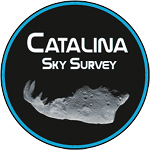The study of asteroids crosses several disciplines, so one does not necessarily have to become an astronomer to study asteroids. There are scientists who study asteroids with backgrounds ranging from astronomy, physics, mathematics, chemistry, geology, and engineering. A physicist or mathematician might explore the detailed motions or the orbital dynamics of asteroids and asteroid 'families' which provide key evidence of how the solar system formed and continues to evolve. A chemist (geochemist or cosmochemist) will explore what elements and minerals asteroids are made which is important to understand their evolution, and for possible resource deposits. These scientists might also study meteorites that fall to earth that provide direct geochemical information about their 'parent' bodies, the asteroids. Since asteroids are made of rocks and minerals, and the impact of asteroids upon Earth (and other planets) over deep time is a geologic process, geologist also study asteroids. Interestingly, we also live in a time when commercial organizations and governments are becoming highly interested in studying asteroids, mostly as they consider how we might exploit them as space resources for their contained mineral wealth. Asteroids and their resources will become very important for the development of long-term space exploration and our eventual colonization of space. For this purpose, engineers are needed to design instruments (such as ground and space-based telescopes) to further survey and characterize asteroids, and aerospace and instrument engineers to design probes, spacecraft, and robots to visit and begin exploiting asteroid resources. For those with curiosity and a thirst for scientific adventure, asteroids offer endless possibility for discovery!



